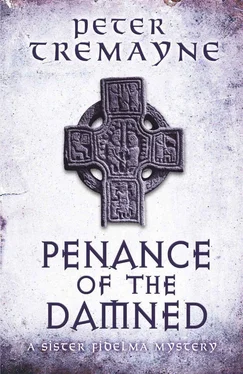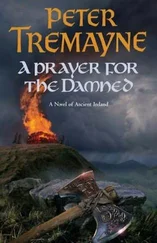Peter Tremayne - Penance of the Damned
Здесь есть возможность читать онлайн «Peter Tremayne - Penance of the Damned» весь текст электронной книги совершенно бесплатно (целиком полную версию без сокращений). В некоторых случаях можно слушать аудио, скачать через торрент в формате fb2 и присутствует краткое содержание. Год выпуска: 2016, Издательство: Headline, Жанр: Исторический детектив, на английском языке. Описание произведения, (предисловие) а так же отзывы посетителей доступны на портале библиотеки ЛибКат.
- Название:Penance of the Damned
- Автор:
- Издательство:Headline
- Жанр:
- Год:2016
- ISBN:нет данных
- Рейтинг книги:5 / 5. Голосов: 1
-
Избранное:Добавить в избранное
- Отзывы:
-
Ваша оценка:
- 100
- 1
- 2
- 3
- 4
- 5
Penance of the Damned: краткое содержание, описание и аннотация
Предлагаем к чтению аннотацию, описание, краткое содержание или предисловие (зависит от того, что написал сам автор книги «Penance of the Damned»). Если вы не нашли необходимую информацию о книге — напишите в комментариях, мы постараемся отыскать её.
Penance of the Damned — читать онлайн бесплатно полную книгу (весь текст) целиком
Ниже представлен текст книги, разбитый по страницам. Система сохранения места последней прочитанной страницы, позволяет с удобством читать онлайн бесплатно книгу «Penance of the Damned», без необходимости каждый раз заново искать на чём Вы остановились. Поставьте закладку, и сможете в любой момент перейти на страницу, на которой закончили чтение.
Интервал:
Закладка:
‘I was not here when the abbot was killed, so cannot help you with any details,’ the religieux offered immediately.
‘So I have already heard. I believe that you and your companion are of the Muscraige Mittine?’
‘That is so, lady,’ he replied nervously. ‘Brother Mael Anfaid and I are cousins. We received our education together and both decided to join the community at Imleach.’
‘Why choose Imleach?’ Fidelma queried. ‘There are many other well-known scholastic communities that are nearer to your homeland.’
‘But which one compares with the reputation of Imleach, founded by the Blessed Ailbe, the Chief Abbey of the Kingdom of Muman?’ Brother Mac Raith responded with a note of pride.
‘Then you were attracted solely by the scholastic reputation of Imleach?’ She was amused by the adulation in his voice.
‘I had developed a fair hand when I was young, lady, and wanted to became adept in calligraphy. Imleach was a natural choice.’
‘How long have you been in that community?’
‘Ten years – and now I am chief scribe. That was why Abbot Segdae chose me to accompany him to this council.’
‘You certainly have a well-chosen name for a member of such a community,’ smiled Fidelma.
The young man hesitated with a frown until he realised that she was referring to the meaning of his name, which was: ‘son of grace’.
‘A better name than my poor kinsman, Mael Anfaid,’ he replied with a grin. ‘Alas, it is apposite in the circumstances.’
Fidelma answered the jest with a smile as the name meant ‘follower of the storm’.
‘It does appear that a storm has erupted here,’ she conceded. ‘But as chief scribe at these discussions, your task must be an onerous one.’
‘It is a task that is not beyond the limits of my capabilities,’ the young man answered with some pride. ‘However, there has been little work for me to do in the circumstances. We were expecting a council of scholars and were faced only with the Abbot of Mungairit and his steward.’
‘So Abbot Segdae was expecting to attend a full council, not just some preliminary talks with Abbot Nannid?’
‘We all thought there would be several leading churchmen of the Ui Fidgente to debate with,’ confirmed the scribe.
‘Have you kept a record of these discussions so far?’
‘Little enough, lady,’ Brother Mac Raith replied. ‘We were only into the second day of discussions when the abbot was struck down.’
‘Is it possible to see those notes anyway?’
‘I do not have them, lady. The custom was that, at the end of the day, I would transcribe from the ceraculum , the wax tablets on which I make the notes. The record was placed on papyrus and would be handed to Brother Tuaman.’
‘He keeps these records?’
‘I suppose so. He doubtless shows or gives them to the abbot and Prior Cuan,’ the man added. They would have to agree that I had made a correct summation of the discussions.’
‘I will ask Brother Tuaman if I might see them. However, out of interest, can you recall what was discussed during those two days?’
Brother Mac Raith actually grinned. There was a lot of posturing.’
‘Meaning?’ Eadulf queried.
‘The Ui Fidgente were determined to justify their cause even though their prince had signed a peace with King Colgu. Abbot Nannid was, indeed, the only spokesman during the entire two days, talking about the claims of his eponymous ancestor Fiachu Fidgennid. I have to say Abbot Segdae was very patient.’
‘What about ecclesiastical matters? Was anything mentioned about the Penitentials?’ Fidelma asked.
‘Abbot Nannid made the claim that all the abbeys and bishops of the Ui Fidgente were now agreed that they would adopt the Penitentials written by someone called Cuimin. He had based his rules on a text called De Paenitate by a Roman writer named Aurelius Ambrosius.’
‘And who is this Cuimin?’ Eadulf asked. ‘Is he an Ui Fidgente scholar?’
‘I believe that he is now dead. Abbot Nannid spoke of him in the past tense. It seems that he was from near Loch Lein where he had established a church. He was mentioned as being the son of Fachna, a chieftain of that area.’
‘Abbot Nannid claimed all the Ui Fidgente abbots and bishops had adopted these rules?’
‘That is so, lady. Yet I heard Abbot Segdae remark that it was curious that only Abbot Nannid represented them at these discussions.’
There was something in his voice that made her say: ‘You sound sceptical of the truth of this?’
The scribe thought for a moment, as if considering what he should say. ‘It is just that the religious community here do not support Abbot Nannid.’
‘Really? In what way?’ she asked sharply.
‘Brother Mael Anfaid and I have a kinsman in the Abbey of Nechta. From what he says, his community were more or less forced to accept the Penitentials by Abbot Nannid.’
She glanced meaningfully at Eadulf. ‘Is this the kinsman that Brother Mael Anfaid and you went to see on the night the abbot was killed?’
‘That is correct, lady. He is Brother Eladach who holds the office of aistreoir , doorkeeper of the community. It was never called an abbey before Nannid arrived and ordered it to be enclosed.’
‘I recall that when we visited here about six or seven moons ago,’ Eadulf remarked, ‘there was a small community around the chapel. It was nothing so grand as an abbey. There were no walls, just a group of people who were part of the township but devoting some of their work to the chapel.’
‘That is so,’ agreed the scribe. ‘Nechta was a local woman who became converted to the New Faith. She established the chapel. After Nannid arrived, I am told that there have been great changes which have displeased the entire community. A wall has been built enclosing them and the new rules have been imposed.’ He suddenly paused and looked at them in warning. ‘But Eladach’s views must not be aired abroad, especially to Abbot Nannid. The community felt they had no option but to accept because of Nannid’s rank, and he apparently threatened to use these Penitentials to punish them if he was not obeyed. But do not attribute this to Brother Eladach, please, lady.’
Fidelma offered him reassurance. ‘Everything that you tell me remains strictly between us, unless it has a direct bearing as evidence in a criminal proceeding.’
‘Something you said puzzles me,’ Eadulf remarked thoughtfully. ‘You speak as if Abbot Nannid has been here some time. Did he not come here just for this council only a week or so ago?’
Brother Mac Raith looked troubled. ‘You must speak with Eladach on that matter. He implied that Abbot Nannid had been here a long time.’
‘We will take it up with Brother Eladach,’ Fidelma assured him. ‘He is a kinsman of yours, you say?’
‘He is Mael Anfaid’s uncle and a cousin of mine. Eladach chose to join this community here long ago when it was just a group of folk, each pursuing their own professions – he was a carpenter. That was long before it was enclosed.’
‘So you and Brother Mael Anfaid share Brother Eladach’s thoughts?’
‘We do.’
‘So let me return to that evening – the evening when Abbot Segdae was killed,’ said Fidelma. ‘You and Mael Anfaid both went to see his uncle, Eladach?’
‘We did.’
‘At what time did you return to the guest-hostel and hear the news of the abbot’s death?’
‘We stayed to join him in the last meal of the day and then the last service. We came back towards midnight and found the fortress awake and in uproar. That is when we heard the terrible news.
‘How did you come back?’
The scribe frowned, trying to understand the question. ‘How? How else but walk?’
Читать дальшеИнтервал:
Закладка:
Похожие книги на «Penance of the Damned»
Представляем Вашему вниманию похожие книги на «Penance of the Damned» списком для выбора. Мы отобрали схожую по названию и смыслу литературу в надежде предоставить читателям больше вариантов отыскать новые, интересные, ещё непрочитанные произведения.
Обсуждение, отзывы о книге «Penance of the Damned» и просто собственные мнения читателей. Оставьте ваши комментарии, напишите, что Вы думаете о произведении, его смысле или главных героях. Укажите что конкретно понравилось, а что нет, и почему Вы так считаете.












